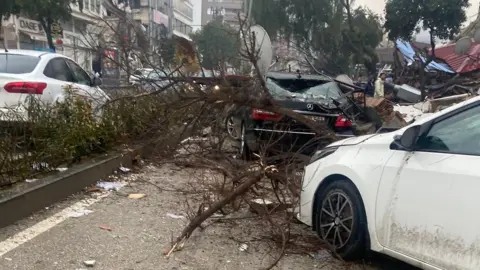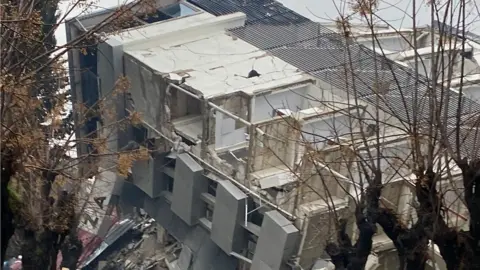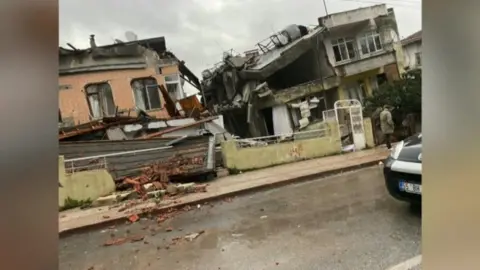Harrowing scenes for West Midlands rescuers in quake-hit Turkey
 Atiqur Rahman
Atiqur RahmanA man helping with the earthquake rescue effort in Turkey said his team was dealing with "Armageddon".
Atiqur Rahman from Global Relief Trust, based in Aston in Birmingham, said scenes they were witnessing in Antakya by the Syrian border were shocking.
Over 70 search-and-rescue specialists have flown out from Birmingham Airport a day after two huge quakes struck.
More than 5,000 people died after a 7.8 magnitude quake struck southern Turkey and northern Syria on Monday morning.
A 7.5-magnitude tremor then hit at around 13:30 local time (10:30 GMT).
Shreen Mahmood, from SKT Welfare in Birmingham, said she had lost contact with her team since the second quake.
The charity, which provides urgent aid and support to people around the world, has a team on the ground in Turkey.
Ms Mahmood said thousands of buildings and roads had been destroyed and videos she had seen showing the destruction and devastation were distressing.
 Atiqur Rahman
Atiqur Rahman"It's very harrowing, it's very widespread destruction," she said.
Getting access to affected areas was difficult as some airports have also been damaged and her organisation was trying to re-establish contact with their team.
"That's how scary the situation is," she added.
Mr Rahman, who also owns a takeaway restaurant in Stoke-on-Trent, said he was in Syria on an aid mission when the earthquake first struck but managed to travel to Turkey.
"The only way to describe it is, all the Hollywood movies and books you read about Armageddon and the world ending - this is how I would describe it." he said.
Buildings had either fallen sideways or collapsed floor by floor trapping people inside, he said.
"But you're having to make choices about leaving people," he said.
"There must've been about 30-odd tremors yesterday and that makes the whole thing unstable."
He said the military and airlifting team were now on the ground and aid was starting to get through. It would take years for the country to recover, he added.
 Atiqur Rahman
Atiqur RahmanHe added: "For every person we rescue, there's probably four or five bodies we find that are either dead or we really can't do much with.
"I've been to cities [through his charity relief work] that have been bombed out and it's left a trail of destruction and this has just happened in one and a half minutes... and you're talking cities that have taken hundreds of years to build, have just been flattened."
Burchin Tanatti Martins is from Turkey but now lives in Hereford where she runs a Portuguese cafe. She said she was tearful about what was happening and was supporting a friend in London who was trying to trace relatives.
She said authorities had not learned from the huge earthquake that shook the country in 1999 in terms of new building requirements brought in from 2004 to ensure they can withstand earthquakes.
"I cannot imagine the poor people - they have been living [through] a lot and now this. It's winter too. It's very heart breaking," she said.
Foreign Secretary James Cleverly said the impact of the quakes was "on a scale that we have not seen for quite some time".
The government said it was looking at ways it could support humanitarian action in northwest Syria, and that its first approach would be to work through the United Nations (UN).
 Atiqur Rahman
Atiqur RahmanPavel Albores, from the Aston Crisis Management Centre at Aston University, is in touch with rescuers on the ground in Turkey.
He said there had been significant investment in new, safer buildings since the 1999 quake but mainly in northern Turkey.
"This is a very, very serious situation... and I guess what we can do in terms of here in the UK is help with donations through established agencies that can help on the ground," he said.
In Coventry, Haran Singh Gill from Khalsa Aid said a team from the organisation arrived in Turkey on Tuesday morning as part of a 100-car convoy of medics and rescuers from Iraq.
"They're setting up now with hot food and procuring water bottles, tents, shelters," he said.
He said the aftershocks were causing complications, but that the team was very experienced dealing with these type of situations.
Dr Ian Stimpson, senior lecturer in geophysics at Keele University, said earthquakes of this magnitude average about 10 a year.
"The problem here is it's so close to major centres of population and it's caused a lot of damage and a huge loss of life," he said.
Over 300 aftershocks have already been recorded from the two quakes.
"I would anticipate aftershocks to continue for weeks if not months if not years," he added.

Follow BBC West Midlands on Facebook, Twitter and Instagram. Send your story ideas to: [email protected]
